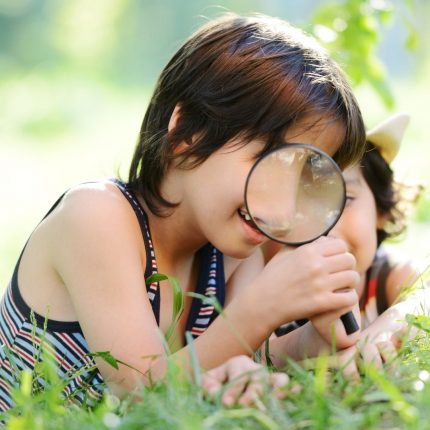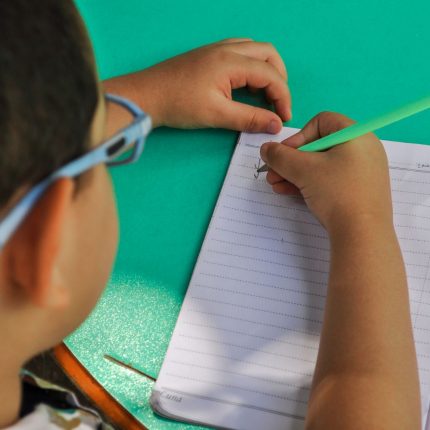
5 Great Ways to Utilize Outdoor Learning
August 2, 2021This post is sponsored by Quarto Classroom.
Summer might technically be winding down, but there has truly never been a better time to take classes and learning opportunities outdoors and into the wild! Here are a few ways to revolutionize the way kiddos are learning:
Transform a geography lesson into an at-home trip around the 50 States
Exploring and studying geography doesn’t have to be a stationary activity! Instead of pulling out maps and memorizing facts, try acting them out! 50 Adventures of the 50 States author Kate Siber, for instance, takes this standard learning opportunity and gets creative by encouraging kids to physically act out different activities from each of the 50 United States. Don’t just read about how biking is popular in Iowa or Utah is popular for canyoneering, but actually give it a try! What does the physical act of canyoneering look and feel like? What parts of your body do you need to strengthen in order to explore a vast canyon? Engage the whole body, not just your mind, as you move around the home pretending to delve into a local canyon. Check out activities for each of the 50 states here.
Get up close and personal with local bees
Bees are essential to preserving the ecological balance and biodiversity in nature, so it’s time to set aside your preconceived notions and engage with these essential pollinators! Learn about how vitally important bees are to our way of life and tales from places like Greece, Thailand, and India to see the vital role bees play in every ecosystem. The Secret Life of Bees author Moira Butterfield takes young learners up close and personal with some actual bees and helps to drive home basic learning points like bee biology, bee migration, common enemies of the bees, and how bees work together to better their own communities and provide essential services to our ecosystem. And, of course, there are tips on how humans can help the bees too! Check out some tips on interacting with bees here.
Turn an “ordinary” walk into a nature walk
Planning a family hike or walk? Turn the trip into an opportunity to learn about your local flora and fauna! And take it one step further by engaging in activities that activate all 5 senses! Vita Murrow, the author of the True Stories of Animal Heroes series, takes kiddos outside and encourages young learners to interact with the plants and animals around them using all 5 senses:
- taste local berries and nuts
- smell the difference between overgrown grass and freshly cut grass
- listen to and try to identify local birds by their chirping
- touch different kinds of plants and theorize how each one might have evolved this way as a survival technique
- And, of course, keep those eyes open to take in nature around you!
If you’re looking for a good starting point, we recommend downloading this nature BINGO card and a blank Animal Hero badge here.
Expand the creativity of your biology lessons
While you’re learning about local flora and fauna, why not stretch the imagination and include fairies too? For a creative way to learn about biology and species evolution, consider encouraging young learners to build an entirely new world and incorporate things like fairy anatomy, evolution, and language. Approach the fairy world like it’s part of our own and encourage kids to think outside the box as they consider where different types of fairies live, what kind of physical attributes they must have in order to survive in those environments, who their natural enemies are, and what the average life cycle of a fairy might look like. Have kids focus on their own surrounding nature and how a fairy would use this local environment to create a fairy community. What would be the biggest challenges to surviving? Get creative and have kids design their own fairies based on their answers to these very real questions here.
Focus on sustainable and natural food
Where does our food come from? What role do farms play? What is it like to be a farmer? Food is an integral part of our lives, so take a closer look at how the food we eat is grown and makes its way onto our plates. Visit a local farm or even head out to your own garden patch and discuss how the science and practices of farming affect us on a daily basis. Farmers can’t just plant things and expect them to grow, so consider what conditions farmers need to grow our food and why it’s important to eat healthy, to source food from reliable sources, and how kiddos can take control of their own consumption habits. And, of course, give some thought to how other animals (not just humans!) contribute to creating our food. Check out this educator guide focused on the workings of organic farms here.
 About Quarto Classroom
About Quarto Classroom
Quarto Classroom is a free video library on YouTube of Quarto’s creators using their books as teaching tools in educational spaces. Each video focuses on subjects ranging from Engineering to Social Sciences to Arts & Crafts, with Quarto creators guiding students through self-led discussions and projects that make the subjects tangible and practical (and fun!). Many videos are accompanied by additional printable materials so students can follow along, participate in the lesson plans, and take the information they learn from the video into the world. With classes aimed at all ages, the sky is the limit when it comes to at-home learning, and whether you’re looking for a versatile lesson plan or an expert to get down and dirty on a subject, Quarto Classroom videos are the perfect way to ensure children are learning no matter the subject or setting.
Looking for even more lessons that creatively supplement the curricula you’re already teaching? Check out the full Quarto kid’s books here.
Additional Homeschool Resources
10 Ways to Take Your Learning Outdoors
Get Outdoors and Hands-On with Science
How to Learn Outside No Matter the Weather
Latest Posts

Can you believe May is here and summer is just around the corner?! Whether you're winding down your homeschool year or preparing to continue forging ahead with your learning, hopefully, these…
Read more >
It’s been known for millennia that children love stories. As human beings, our brains are wired to receive information in this form. Stories help the reader form the emotional connection…
Read more >
While nearly every college and university today is eager to accept homeschooled students into their institutions, homeschooling families need to understand that their student’s application…
Read more >

